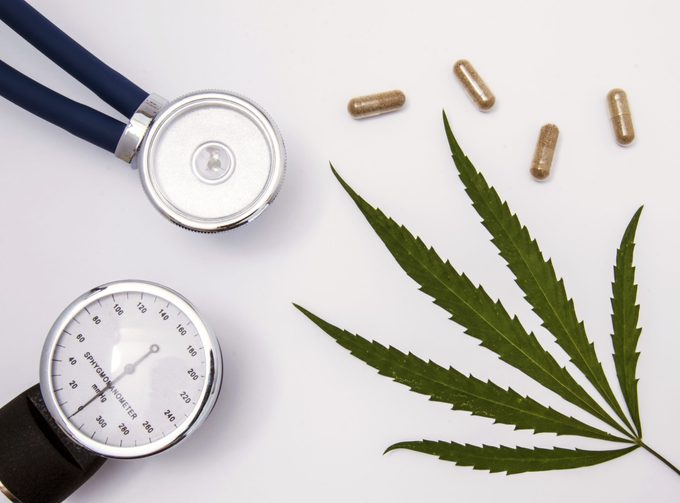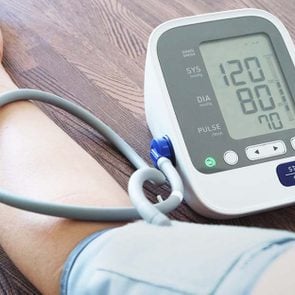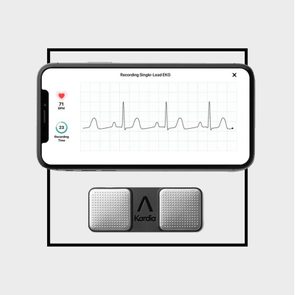What You Should Know About Marijuana and High Blood Pressure
Updated: Oct. 10, 2022
If you have high blood pressure, you may want to proceed with caution when it comes to using marijuana. Here's what experts want you to know.
Marijuana and high blood pressure
More and more states are legalizing marijuana for medical and/or recreational use. However, if you are one of the millions of people with high blood pressure, you should probably proceed with caution when it comes to marijuana.
High blood pressure is a major risk factor for heart attack and stroke. It is called a silent killer as there are often no symptoms until it has started to affect your heart or other organs. Stage 1 hypertension is defined as a systolic blood pressure reading of 130-139 millimeters of mercury (mm Hg) and a diastolic reading of 80-89 mm Hg. Stage 2 hypertension is 140 mm Hg or higher and 90 mm Hg or higher. (A blood pressure below 120/80 mm Hg is considered normal.)
More than two million Americans with heart disease currently use or have used marijuana, according to a study published in 2020 in the Journal of the American College of Cardiology. This may be risky, says Robert A. Kloner, MD, chief science officer and director of cardiovascular research at Huntington Medical Research Institutes in Pasadena, California.
One study, published in 2016 in the Journal of Hypertension, found that recent marijuana use was linked to higher systolic blood pressure levels. Systolic blood pressure measures the pressure of blood in the arteries when the heart beats. Diastolic blood pressure measures the force when the heart is at rest between beats.
In the study of people aged 20 to 59, about 1500 people who used marijuana in the past 30 days were compared to roughly 5,000 never-users and 5,000 people who had used marijuana in the past, but not in the last 30 days.
Based on the results, the researchers estimated that using marijuana daily for 30 days would result in a systolic blood pressure about 3 points higher than people who never used it or used it in the past. This “modest association” jibes with other studies that have found marijuana can cause a short term rise in blood pressure but the long-term impact is less clear, they concluded.
Another study based on similar national survey data was published in 2019 in The American Journal of Health Behavior. That study found that current heavy users of marijuana were 1.8 times more likely to have high blood pressure than their counterparts who never used marijuana. Of people who used marijuana one or more times in the last 30 days, 19.4 percent had elevated blood pressure, 22.7 percent had stage 1 hypertension, and 12.9 percent had stage 2 hypertension, compared with 16.1 percent, 21.4 percent, and 11.9 percent of never users. People at risk of high blood pressure should “use caution” when it comes to heavy marijuana use, the authors concluded.

Marijuana, high blood pressure, and heart attacks
Another concern is a possible risk of heart attack in some marijuana users.
In a 2019 research letter in Mayo Clinic Proceedings, Ohio researchers reported that people who used cannabis had a 1.7-fold higher risk of heart attack than similar people the same age who did not use it. Although the cannabis users had other risk factors like obesity, high blood pressure, type 2 diabetes, and other drug use, like tobacco, alcohol, and cocaine, their heart attack risk was higher even after taking these into account. Over a 3-year period, the findings suggest that 1.37 percent of cannabis users would have a heart attack compared with 0.54 percent of non-users.
“There is increasing evidence that marijuana use may trigger heart attacks in some individuals,” says Dr. Kloner, who is also a professor of medicine at the Keck School of Medicine at University of Southern California in Los Angeles. “States where marijuana use has been legalized have seen increases in emergency ward visits and hospitalizations for marijuana-related side effects, including an increase in heart attacks, especially in young men.”
Exactly how marijuana might raise the risk for heart attack isn’t fully understood. But the drug may cause your sympathetic nervous system to release the stress hormones adrenaline and cortisol, increasing heart rate and blood pressure.
There are more questions that need to be answered before experts can draw any conclusions about marijuana, high blood pressure, and the heart.
“In general, there is a need for a lot more research on the effects that marijuana has on the heart,” says Dr. Kloner. “Both acute exposure and chronic exposure studies are needed that consider other risk factors that marijuana users may have, including smoking cigarettes.” (Here’s how you can avoid high blood pressure.)
The potential effects of THC vs. CBD
A lot of the uncertainty may come down to the components in the bud such as THC (delta-9-tetrahydrocannabinol) and CBD (cannabidiol), says Dr. Kloner. THC and CBD are two of the main compounds found in cannabis plants such as marijuana and hemp. Marijuana contains much more THC than hemp, while hemp boasts more CBD. (Here’s the difference between CBD vs. THC.)
The two compounds act very differently in the body. “CBD may actually have some beneficial effects on the cardiovascular system, while THC tends to stimulate the sympathetic nervous system and may be more deleterious,” Dr. Kloner says.
Plus, he points out, you don’t always know how much of either you are getting in any preparation. “The net results may depend upon the overall concentration of these components in the marijuana sample and how the individual responds to the components,” he says.
Marijuana and weight gain
Some people who use marijuana may have an increased appetite, says Dana Greene, RD, a registered dietitian in Brookline, Massachusetts. “If you use marijuana often, you may end up consuming a lot of extra calories which can lead to weight gain over time,” she says. If you are obese or overweight, your risk for developing high blood pressure and heart disease also increases, she notes.
Medical marijuana status and uses
There are two FDA-approved drugs that contain THC. These drugs treat nausea caused by chemotherapy for cancer and increase appetite in people who have severe weight loss from AIDS, according to MedlinePlus.
So far, 36 states, as well as the District of Columbia, Guam, Puerto Rico, and the U.S. Virgin Islands have approved medical marijuana. Previous research suggests it can help relieve pain, some symptoms of HIV/AIDS, cancer, glaucoma, and multiple sclerosis, nausea, and vomiting. Medical marijuana may also stimulate appetite, notes the National Conference on State Legislatures.
Some people turn to marijuana to reduce anxiety or stress, both of which can cause direct and indirect increases in blood pressure.
“As a general rule, I would not prescribe marijuana to lower blood pressure,” Dr. Kloner says. “There are well-proven lifestyle modifications as well as medicines which lower blood pressure and have been shown to reduce [heart attacks and stroke].” These include eating a low-sodium diet, engaging in regular physical activity—especially aerobic exercise like brisk walking—drinking alcohol only in moderation, and not smoking.
If you use marijuana to treat a medical condition, you may want to weigh the benefits and potential risks—like a possible increase in blood pressure—with your doctor. (This is the best exercise for high blood pressure.)
The last word
While more research is needed, you may want to think twice about using marijuana if you have high blood pressure or other heart disease risks, says Michael Goyfman, MD, director of clinical cardiology at Long Island Jewish Forest Hills in Forest Hills, New York.
If you have high blood pressure and use marijuana, you may want to take a break and see if your blood pressure improves, he suggests.
Next, try these natural remedies for high blood pressure.





















